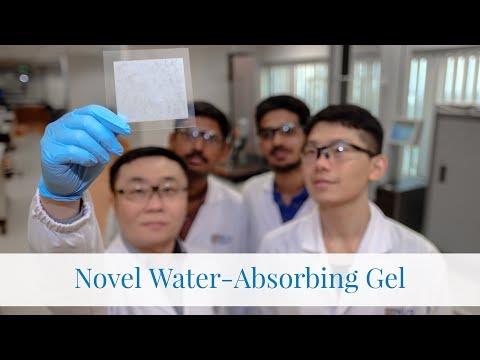According to data recorded at the Changi Climate Station, daytime temperatures in Singapore typically would not exceed a maximum of 33°C. However, Singapore’s high relative humidity can cause a significantly warmer “feels like” temperature.
Assistant Professor Tan Swee Ching from the National University of Singapore explains, “In a humid environment, the air is saturated with water and as a result, sweat on our body evaporates more slowly. This causes us to feel hotter than the
actual ambient temperature, leading to great discomfort.”
A unique hydrogel material invented by Prof Tan and his team offers a potential solution.
The hydrogel works by absorbing moisture from the surrounding environment to dehumidify ambient air for enhanced thermal comfort. It can reduce relative humidity in a confined space from 80% to 60% in less than seven minutes – on warm days, this
can translate to a reduction in the “feels like” temperature of as much as 7°C, according to the U.S. National Oceanic and Atmospheric Administration heat index. In other words, a person can feel cool and less humid with only the hydrogel and without
using fans, air conditioners, or other cooling devices.
If that is not enough, the hydrogel also displays various optical, electrical and electrochemical properties after it has absorbed moisture, which allow it to be used for a wide range of practical applications, including as a smart window material,
sun or privacy screen, conductive ink and emergency battery.
The research team has shared that its hydrogel is cheap, easy to produce and performs eight times better than commercial drying agents. By coating it onto walls, windows and decorative items, the hydrogel can be used in both indoor and outdoor
environments, such as hospital wards, classrooms, bus stops and parks.
With funding from Temasek Foundation Ecosperity, the research team will produce the hydrogel for larger scale real-world test-bedding in both indoor and outdoor spaces to further advance its different applications.
FIND OUT MORE…
Did you know…
The heat index, also known as the apparent temperature, is what the temperature feels like to the human body when relative humidity is combined with the air temperature. It was developed in 1978 by George Winterling and contains assumptions about
the human body mass and height, clothing, amount of physical activity, thickness of blood, sunlight and ultraviolet radiation exposure, and wind speed.
About Temasek Foundation Ecosperity
Temasek Foundation Ecosperity is a non-profit philanthropic organisation set up by Temasek and sponsored through Temasek Trust.
Temasek Foundation Ecosperity champions the sustainability of our global ecosystem. It funds translational research that brings about enduring solutions, systems and capabilities against environmental, biological and other adversities affecting
our community, in order to enhance sustained liveability in Singapore and beyond.
IMPACT HUB
Enhancing Thermal Comfort in the Humid Tropics
30 Jul 2018



